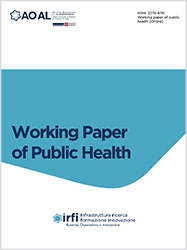Psychological effects of COVID-19 outbreak in hospital workers during the Italian third phase

All claims expressed in this article are solely those of the authors and do not necessarily represent those of their affiliated organizations, or those of the publisher, the editors and the reviewers. Any product that may be evaluated in this article or claim that may be made by its manufacturer is not guaranteed or endorsed by the publisher.
Objectives: The aim of the study was to explore the psychological impact of COVID-19 outbreak, during the so-called phase three of the infection in Italy, in healthcare workers and other professionals working in the Public Hospital “SS Antonio e Biagio e Cesare Arrigo” in the Piedmont Region.
Methods: A monocentric prospective observational study was conducted on 113 hospital workers by completing an online survey. Data were collected from 29th June to 20th July 2020. The survey assessed self-reported socio-demographic, clinical, work and COVID-19 related information and risk perception. Moreover, it included an online version of validated questionnaires in the Italian language: Impact of Event Scale-Revised (IES-R), Depression, Anxiety and Stress Scale (DASS-21), Insomnia Severity Index (ISI), Coping Orientation to the Problems Experienced: COPE-NVI-25, and the Professional Quality of Life scale (ProQOl-5).
Results: The exploratory analysis revealed that hospital workers showed a high percentage of post-traumatic stress symptoms in the months following the beginning of the pandemic. In general, having higher levels of education seems to be associated with less anxiety, stress, depression insomnia e post-traumatic stress symptoms. Those symptoms were reported among those who had higher risk perception, previous psychological problems, or suffered from a chronic disease. Workers with more than 10 years experience and low risk perception reported less insomnia symptoms.
Conclusions: The assessment of psychological effects of COVID-19 outbreak might help to create good practices that could be used and improved to implement focused interventions on workers’ well-being, especially during COVID-19 and post COVID-19 periods.
PAGEPress has chosen to apply the Creative Commons Attribution NonCommercial 4.0 International License (CC BY-NC 4.0) to all manuscripts to be published.

 https://doi.org/10.4081/wpph.2021.9457
https://doi.org/10.4081/wpph.2021.9457




